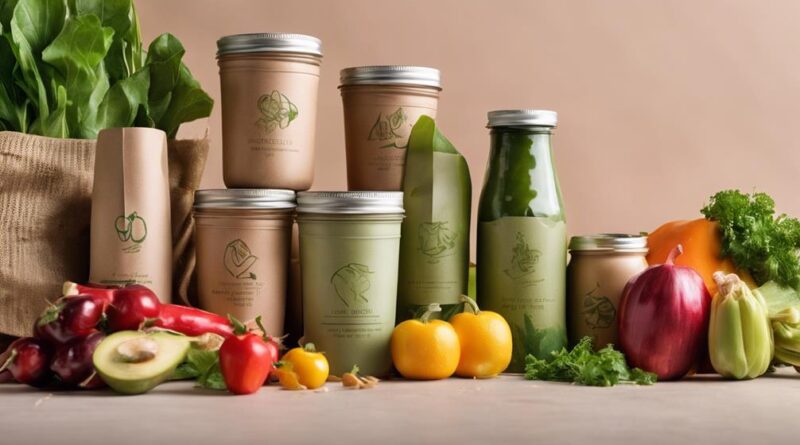3 Best Eco-Friendly Packaging Solutions for Health Foods
For the health-conscious consumer, consider these eco-friendly packaging solutions. Biodegradable options use sustainable materials that break down naturally, reducing your carbon footprint. Compostable packaging goes a step further, utilizing earth-friendly materials like plant-based plastics that enhance soil health. Recyclable innovations in the health food industry focus on materials easily recycled without sacrificing quality, utilizing biodegradable plastics derived from renewable resources or even edible packaging made from natural ingredients. Stay ahead by opting for these sustainable choices to make a positive impact on the environment and your health foods. Further details on each option await.
Biodegradable Packaging Options
When considering eco-friendly packaging solutions for health foods, biodegradable options stand out as a sustainable choice that minimizes environmental impact. Sustainable materials are at the core of biodegradable packaging, offering a way to reduce the carbon footprint associated with traditional packaging materials. These materials are designed to break down naturally over time, reducing the amount of waste that ends up in landfills and oceans. By choosing biodegradable packaging, you're actively contributing to a healthier planet by minimizing the environmental impact of your product packaging.
One key benefit of using biodegradable packaging is its ability to decompose into natural elements without leaving behind harmful residues. This process significantly reduces the pollution caused by packaging materials and helps to conserve valuable resources. The environmental impact of biodegradable packaging is far lower compared to non-biodegradable alternatives, making it an innovative solution for health food companies looking to align with sustainable practices.
Moreover, the production of biodegradable packaging often requires less energy and water compared to traditional packaging materials. This data-driven approach not only reduces greenhouse gas emissions but also helps in the conservation of water, a critical resource for our planet. By opting for biodegradable packaging options, you're actively participating in the global effort to promote sustainability and protect the environment for future generations.
Compostable Packaging Solutions
How can compostable packaging solutions revolutionize the sustainability of health food packaging?
Compostable packaging offers sustainable alternatives that can significantly reduce the environmental impact of packaging materials. By utilizing earth-friendly materials such as plant-based plastics, compostable packaging can break down into organic matter when disposed of properly, returning nutrients back to the soil and completing a full circle of sustainability.
One key advantage of compostable packaging solutions is their ability to reduce waste sent to landfills. Traditional packaging materials often end up in landfills, where they can take hundreds of years to decompose fully. In contrast, compostable packaging can biodegrade within months under the right conditions, minimizing the burden on landfills and decreasing greenhouse gas emissions.
Moreover, compostable packaging can help enhance soil health when used in composting systems. As these materials break down, they release valuable nutrients into the compost, enriching the soil and promoting plant growth. This closed-loop system not only reduces waste but also supports a more sustainable approach to packaging production.
Recyclable Packaging Innovations
Innovative recyclable packaging solutions have emerged as a promising avenue for advancing sustainability in the health food industry. Sustainable materials play a crucial role in these advancements, with a focus on using materials that can be easily recycled without compromising quality or performance. Green packaging technologies are at the forefront of this movement, offering new ways to create packaging that's both environmentally friendly and functional.
One key innovation in recyclable packaging is the use of biodegradable plastics derived from renewable resources such as corn starch or sugarcane. These materials break down naturally over time, reducing the environmental impact of traditional plastic packaging. Additionally, companies are exploring the use of recyclable paper-based packaging that isn't only biodegradable but also easily recyclable in existing systems.
Another exciting development is the introduction of edible packaging made from natural ingredients like seaweed or rice. These innovative solutions not only eliminate waste but also provide a unique and sustainable packaging experience for health food products. By incorporating sustainable materials and green packaging technologies into their products, health food companies can reduce their carbon footprint and appeal to environmentally conscious consumers.
Conclusion
You now have three innovative eco-friendly packaging solutions to choose from for your health foods. Whether you opt for biodegradable options, compostable solutions, or recyclable innovations, you can feel confident in your commitment to sustainability.
These packaging choices not only benefit the environment but also appeal to consumers who are increasingly seeking out eco-friendly products. Make a positive impact on the planet while delivering your nutritious products to health-conscious customers.
